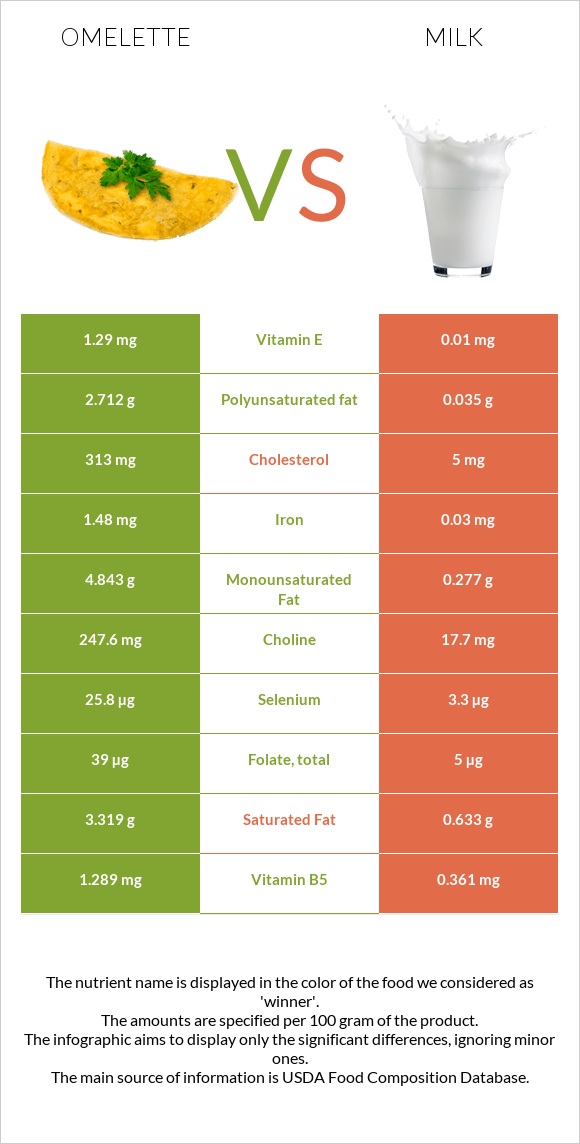Omelette vs. Milk — In-Depth Nutrition Comparison
Compare
Important differences between omelette and milk
- Omelette has more choline, selenium, vitamin B5, iron, vitamin B2, vitamin B12, phosphorus, and vitamin E than milk.
- Omelette's daily need coverage for cholesterol is 103% more.
- Omelette contains 129 times more vitamin E than milk. Omelette contains 1.29mg of vitamin E, while milk contains 0.01mg.
- Milk contains less cholesterol.
- Milk has a higher glycemic index. The glycemic index of milk is 31, while the glycemic index of omelette is 0.
The food varieties used in the comparison are Egg, whole, cooked, omelet and Milk, lowfat, fluid, 1% milkfat, with added vitamin A and vitamin D.
Infographic

Infographic link
Mineral Comparison
Mineral comparison score is based on the number of minerals by which one or the other food is richer. The "coverage" charts below show how much of the daily needs can be covered by 300 grams of the food.
| Contains more IronIron | +4833.3% |
| Contains more CopperCopper | +530% |
| Contains more ZincZinc | +159.5% |
| Contains more PhosphorusPhosphorus | +75.8% |
| Contains more ManganeseManganese | +700% |
| Contains more SeleniumSelenium | +681.8% |
| Contains more CalciumCalcium | +160.4% |
| Contains more PotassiumPotassium | +28.2% |
| Contains less SodiumSodium | -71.6% |
Vitamin Comparison
Vitamin comparison score is based on the number of vitamins by which one or the other food is richer. The "coverage" charts below show how much of the daily needs can be covered by 300 grams of the food.
| Contains more Vitamin AVitamin A | +196.6% |
| Contains more Vitamin EVitamin E | +12800% |
| Contains more Vitamin DVitamin D | +41.7% |
| Contains more Vitamin B1Vitamin B1 | +70% |
| Contains more Vitamin B2Vitamin B2 | +108.6% |
| Contains more Vitamin B5Vitamin B5 | +257.1% |
| Contains more Vitamin B6Vitamin B6 | +286.5% |
| Contains more Vitamin B12Vitamin B12 | +61.7% |
| Contains more Vitamin KVitamin K | +4400% |
| Contains more FolateFolate | +680% |
| Contains more Vitamin B3Vitamin B3 | +45.3% |
All nutrients comparison - raw data values
| Nutrient |  |
 |
DV% diff. |
| Cholesterol | 313mg | 5mg | 103% |
| Choline | 247.6mg | 17.7mg | 42% |
| Selenium | 25.8µg | 3.3µg | 41% |
| Vitamin B5 | 1.289mg | 0.361mg | 19% |
| Iron | 1.48mg | 0.03mg | 18% |
| Polyunsaturated fat | 2.712g | 0.035g | 18% |
| Fats | 11.66g | 0.97g | 16% |
| Vitamin B2 | 0.386mg | 0.185mg | 15% |
| Protein | 10.57g | 3.37g | 14% |
| Vitamin A | 172µg | 58µg | 13% |
| Vitamin B12 | 0.76µg | 0.47µg | 12% |
| Saturated fat | 3.319g | 0.633g | 12% |
| Monounsaturated fat | 4.843g | 0.277g | 11% |
| Phosphorus | 167mg | 95mg | 10% |
| Vitamin E | 1.29mg | 0.01mg | 9% |
| Folate | 39µg | 5µg | 9% |
| Calcium | 48mg | 125mg | 8% |
| Vitamin B6 | 0.143mg | 0.037mg | 8% |
| Calories | 154kcal | 42kcal | 6% |
| Copper | 0.063mg | 0.01mg | 6% |
| Zinc | 1.09mg | 0.42mg | 6% |
| Sodium | 155mg | 44mg | 5% |
| Vitamin K | 4.5µg | 0.1µg | 4% |
| Vitamin D | 69 IU | 48 IU | 3% |
| Vitamin D | 1.7µg | 1.2µg | 3% |
| Carbs | 0.64g | 4.99g | 1% |
| Potassium | 117mg | 150mg | 1% |
| Manganese | 0.024mg | 0.003mg | 1% |
| Vitamin B1 | 0.034mg | 0.02mg | 1% |
| Net carbs | 0.64g | 4.99g | N/A |
| Magnesium | 11mg | 11mg | 0% |
| Sugar | 0.31g | 5.2g | N/A |
| Vitamin B3 | 0.064mg | 0.093mg | 0% |
| Trans fat | 0.709g | N/A | |
| Tryptophan | 0.14mg | 0.043mg | 0% |
| Threonine | 0.467mg | 0.143mg | 0% |
| Isoleucine | 0.565mg | 0.174mg | 0% |
| Leucine | 0.913mg | 0.319mg | 0% |
| Lysine | 0.767mg | 0.282mg | 0% |
| Methionine | 0.319mg | 0.088mg | 0% |
| Phenylalanine | 0.572mg | 0.174mg | 0% |
| Valine | 0.722mg | 0.22mg | 0% |
| Histidine | 0.26mg | 0.101mg | 0% |
| Omega-3 - DHA | 0.049g | 0g | N/A |
| Omega-3 - ALA | 0.004g | N/A | |
| Omega-3 - DPA | 0.006g | 0g | N/A |
| Omega-6 - Eicosadienoic acid | 0.015g | N/A | |
| Omega-6 - Linoleic acid | 0.027g | N/A |
Macronutrient Comparison
Macronutrient breakdown side-by-side comparison
| Contains more ProteinProtein | +213.6% |
| Contains more FatsFats | +1102.1% |
| Contains more OtherOther | +33.3% |
| Contains more CarbsCarbs | +679.7% |
| Contains more WaterWater | +18.1% |
Fat Type Comparison
Fat type breakdown side-by-side comparison
| Contains more Mono. FatMonounsaturated fat | +1648.4% |
| Contains more Poly. FatPolyunsaturated fat | +7648.6% |
| Contains less Sat. FatSaturated fat | -80.9% |
Carbohydrate type comparison
Carbohydrate type breakdown side-by-side comparison
| Contains more GlucoseGlucose | +∞% |
| Contains more LactoseLactose | +∞% |
~equal in
Starch
~0g
~equal in
Sucrose
~0g
~equal in
Fructose
~0g
~equal in
Maltose
~0g
~equal in
Galactose
~0g





